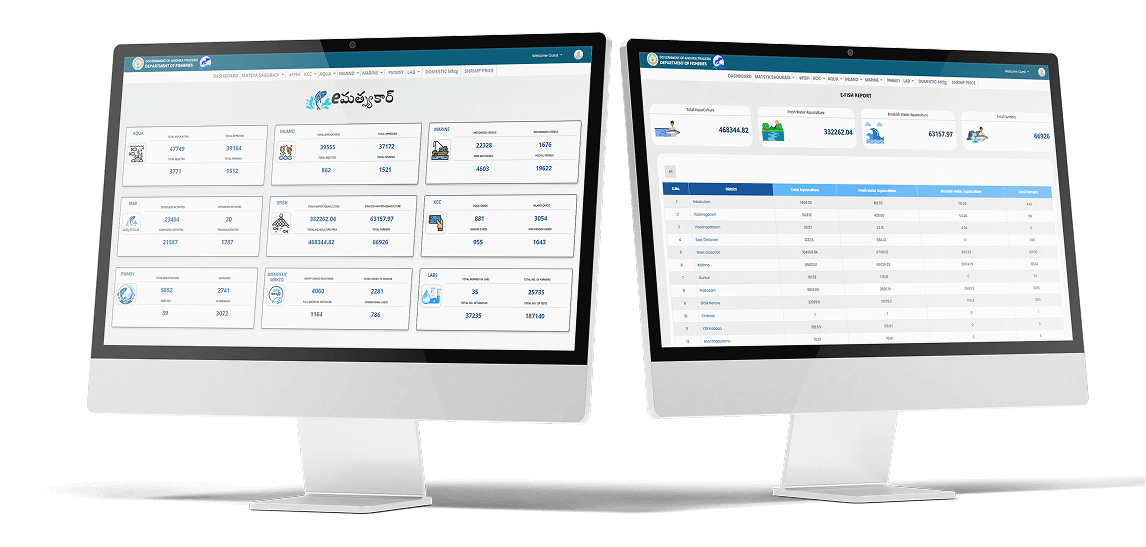
Introduction
The fisheries sector is a vital component of the economy in Andhra Pradesh, supporting the livelihoods of thousands of fishermen and contributing significantly to the state’s food security and export revenues. However, managing the extensive data related to fish farming—spanning every fish acre, pond, and the work of numerous fishermen—has traditionally been a complex, manual, and error-prone process. Recognizing the need for transparency, real-time data, and improved operational efficiency, the Fisheries Department of Andhra Pradesh partnered with RNIT AI Solutions Ltd. to digitally transform its processes through the deployment of an advanced ERP platform.

Background and Challenges
Before digital transformation, the fisheries department faced several critical challenges:
Manual Data Management:
Traditional record-keeping methods were not only time-consuming but also prone to errors. The lack of digitized processes made it difficult to accurately monitor fish production, track fish-pond conditions, and verify the performance of fishermen.
Inefficiencies in Transaction Processing:
With thousands of transactions occurring on a daily basis—from harvest reporting to resource allocation—the manual system struggled to maintain accuracy and speed. This often led to delays in decision-making and reduced accountability.
Lack of Real-time Data:
The fisheries department required a system that could capture and analyze data in real time. Without this capability, any discrepancies in production data or resource usage could go unnoticed, affecting the overall productivity and profitability of the sector.
Accountability and Transparency Issues:
In the absence of a centralized digital system, monitoring the performance of individual fish farms, ponds, and fishermen was a major challenge. This limited the ability of government officials to ensure that resources were optimally allocated and that every beneficiary received due support.
 Given these challenges, the state government sought a robust digital solution to overhaul the existing system. RNIT AI Solutions Ltd. emerged as the partner of choice, owing to its track record in delivering AI-driven and data-centric solutions for public sector departments.
Given these challenges, the state government sought a robust digital solution to overhaul the existing system. RNIT AI Solutions Ltd. emerged as the partner of choice, owing to its track record in delivering AI-driven and data-centric solutions for public sector departments.


The RNIT Solution: ERP for Fisheries
RNIT’s solution for the fisheries department is built on a comprehensive open source ERP platform that digitizes every aspect of fisheries management. Key components of the solution include:
Comprehensive Data Digitization:
The ERP platform is designed to capture and store all relevant data—from fish pond conditions and harvest details to individual transactions. By moving away from paper-based records, the platform ensures that every piece of information is accurately documented and easily accessible.
Real-Time Transaction Processing:
One of the most significant achievements of RNIT’s system is its ability to process thousands of transactions every day. Ensured that data is not only collected but also updated in real time. This capability is critical for timely decision-making and operational agility.
Enhanced Accountability:
By providing real-time data from the ground, the ERP system enables government officials to monitor every fish acre, pond, and the performance of individual fishermen. This transparency helps in ensuring that subsidies, technical support, and welfare benefits reach the right beneficiaries while discouraging fraudulent practices.
Streamlined Operational Workflows:
The digital platform automates several routine tasks that were previously handled manually. For instance, reporting harvest yields, tracking inventory of feed and equipment, and scheduling maintenance for fish ponds are now seamlessly managed through the system. This automation reduces administrative overheads and allows staff to focus on more strategic tasks.
User-friendly interface and Integration:
The ERP system has been developed with a user-centric approach. It integrates seamlessly with existing government databases, including those maintained by other departments, thereby creating a unified ecosystem. The intuitive interface minimizes the training required for staff and ensures that even users with limited technical expertise can navigate the system easily.

Implementation Process in Andhra Pradesh
The rollout of RNIT’s ERP solution for the fisheries department was executed in a phased manner to ensure minimal disruption and maximum uptake:
Pilot Phase and Customization:
RNIT began with a pilot phase in select districts of Andhra Pradesh. During this phase, the system was customized to address local requirements, such as varying types of fish ponds and regional data formats. Feedback from the pilot helped refine the user interface and operational workflows.
Statewide Deployment:
Following a successful pilot, the ERP platform was deployed across the state. Specialized training sessions were conducted for fisheries department officials to ensure a smooth transition from manual to digital processes.
Data Migration and Integration:
A critical aspect of the implementation involved migrating legacy data into the new system. RNIT worked closely with the state IT department to ensure a seamless data transfer, which was essential for maintaining historical records and achieving real-time accuracy. The integration with existing databases further streamlined operations across departments.
Continuous Monitoring and Support:
Post-deployment, RNIT provided ongoing technical support and conducted regular system audits to ensure that the ERP platform continued to meet operational requirements. This proactive approach enabled the department to quickly address any issues and incorporate system enhancements based on user feedback.
Outcomes and Key Achievements
Since the implementation of RNIT’s ERP platform, the Fisheries Department of Andhra Pradesh has witnessed transformative changes:
Enhanced Data Accuracy and Transparency:
With the digitization of all records, data accuracy has improved significantly. Real-time updates ensure that the state has a reliable snapshot of fisheries operations at any given moment, aiding in better planning and policy-making.
Increased Operational Efficiency:
Automation of routine tasks has led to a marked reduction in administrative delays. The ability to process around 2.5 crore transactions to date has not only saved time but also improved the overall efficiency of fisheries management operations.
Cost Savings and Reduced Fraud:
By eliminating manual errors and reducing the scope for fraudulent claims, the digital system has helped in safeguarding public funds. The streamlined process has resulted in significant cost savings, which can now be reinvested into further improving the fisheries sector.
Improved Accountability and Resource Allocation:
The system’s real-time monitoring capability has enabled officials to pinpoint inefficiencies and allocate resources more judiciously. This has been instrumental in ensuring that benefits, subsidies, and technical support are delivered precisely where they are needed.
Empowerment of Stakeholders:
Fishermen, fishery managers, and local officials now have immediate access to critical data. This empowerment has led to more informed decision-making and fostered a sense of ownership among stakeholders, thereby driving overall sector improvement.
Future Directions and Sustainability
The success of RNIT’s ERP platform in Andhra Pradesh sets a precedent for further digital transformation initiatives in the fisheries sector. Looking ahead, RNIT plans to:
Expand Functionality:
Future updates to the platform will include advanced analytics and predictive modules that can forecast production trends and optimize resource allocation even further.
Integration with Additional Government Systems:
By linking the fisheries' ERP platform with other state systems, Andhra Pradesh can create a more holistic view of agricultural and resource management, thereby driving greater inter-departmental synergy.
Continuous Improvement Through Feedback:
RNIT is committed to a continuous improvement model, regularly updating the platform based on user feedback and evolving technological standards.

Conclusion
RNIT AI Solutions Ltd’s digital transformation of fisheries management in Andhra Pradesh exemplifies how technology can revolutionize public sector operations. The Fisheries Department has not only increased efficiency and transparency but also enhanced accountability at every level—from individual fish ponds to statewide operations. The successful integration of real-time data capture, automated workflows, and a user-friendly interface has set a new benchmark in fisheries management, ensuring that resources are optimally utilized and that every stakeholder, from local fishermen to government officials, is empowered by accurate and timely information.
This case study is a testament to RNIT’s commitment to delivering innovative, scalable, and sustainable digital solutions that address real-world challenges. As Andhra Pradesh continues to leverage advanced technology in its fisheries sector, the groundwork laid by RNIT’s ERP platform will undoubtedly catalyze further growth and efficiency in public service delivery.